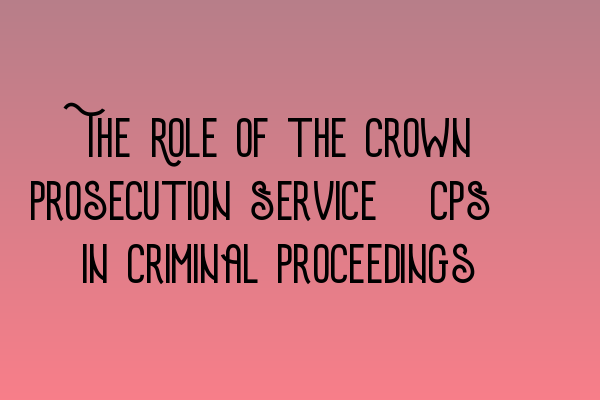The Role of the Crown Prosecution Service (CPS) in Criminal Proceedings
If you find yourself involved in criminal proceedings in the UK, you can expect to encounter the Crown Prosecution Service (CPS). The CPS plays a significant role in the criminal justice system, ensuring that cases are prosecuted effectively and fairly. In this article, we will delve into the vital functions of the CPS and shed light on its impact on criminal proceedings.
What is the Crown Prosecution Service?
The Crown Prosecution Service (CPS) is an independent authority responsible for prosecuting criminal cases in England and Wales. It operates under the superintendence of the Director of Public Prosecutions (DPP) and works closely with the police, courts, and other criminal justice agencies.
The CPS’s primary role is to make independent and fair decisions about the prosecution of criminal cases, weighing the evidence and the public interest in pursuing charges. It plays an essential role in upholding the rule of law and ensuring that justice is served. Now, let’s explore the specific functions of the CPS and how it contributes to criminal proceedings.
Functions of the CPS:
1. Case Review:
The CPS carefully reviews files presented by the police and other investigative agencies to determine whether the evidence is sufficient to bring charges. This process involves assessing the strength and reliability of the evidence and evaluating the public interest in proceeding with the case.
The CPS’s expert prosecutors analyze the evidence and legal issues, providing legal guidance to the police during the early stages of the investigation. Their expertise helps ensure that investigations are conducted effectively and in compliance with the law.
For more information on legal representation in the UK, you can consult the article “Legal Representation for Delaware LLCs in the UK: Expert Advice.”
2. Charging Decisions:
Once the CPS completes its case review, it determines whether there is sufficient evidence to charge an individual with a criminal offense. This decision is crucial, as it directly impacts the course of the criminal proceedings.
The CPS considers various factors, including the strength of the evidence, the seriousness of the offense, and the public interest, to ensure that only appropriate cases proceed to court. The decision-making process must be fair and impartial, reflecting the interests of both the accused and the community.
3. Pre-Trial Preparation:
As part of its role, the CPS assists in preparing cases for trial. This involves working closely with the police and other organizations to gather and analyze additional evidence, prepare witness statements, and organize the overall presentation of the case.
The CPS aims to ensure that all relevant evidence is disclosed to the defense, facilitating a fair and transparent trial. It plays a critical role in upholding the principle of ‘equality of arms’ and ensuring that the accused has a fair opportunity to present their defense.
For those interested in ethical business practices, you can learn more about Delaware’s Code of Conduct in the article “Ensuring Ethical Business Practices: Delaware’s Code of Conduct.”
4. Court Advocacy:
The CPS is responsible for presenting the prosecution’s case in court. Its skilled and experienced prosecutors advocate on behalf of the prosecution, presenting evidence, examining witnesses, and making persuasive legal arguments.
Through effective court advocacy, the CPS seeks to secure convictions where appropriate and ensure that justice is served. Its prosecutors play a crucial role in ensuring the smooth running of the trial and maintaining public confidence in the criminal justice system.
5. Reviewing Convictions and Appeals:
The CPS’s involvement in criminal proceedings extends beyond the trial stage. It also reviews convictions to assess whether there are grounds for appeal or if there were any procedural irregularities during the trial.
Where a conviction appears unsafe or there is new evidence, the CPS may refer the case to the Court of Appeal for review. This aspect of the CPS’s work helps safeguard against miscarriages of justice and contributes to the ongoing integrity of the criminal justice system.
For strategies to overcome legal challenges for UK businesses in the U.S., you can refer to the articles “Legal Challenges for UK Businesses in the U.S.: Strategies for Overcoming Hurdles” and “Legal Challenges for UK Businesses in the U.S.: Strategies for Overcoming Hurdles.”
Conclusion:
The Crown Prosecution Service (CPS) plays a pivotal role in criminal proceedings in England and Wales. From case review and charging decisions to pre-trial preparation, court advocacy, and reviewing convictions and appeals, the CPS ensures that the criminal justice system functions effectively and fairly.
As aspiring solicitors preparing for the SQE exams, it is essential to understand the role of the CPS in order to navigate the criminal law and practice successfully. For essential study materials and exam preparation tips, you can explore the article “SQE Exam Prep: Essential Study Materials for Aspiring Solicitors.”
By upholding the principles of fairness and justice, the CPS helps maintain public trust and confidence in the criminal justice system. Its commitment to independent decision-making and sound legal practices ensures that those involved in criminal proceedings receive a fair and impartial trial.
Remember, when faced with criminal proceedings, understanding the essential role of the CPS can help you navigate the process effectively and protect your rights.
